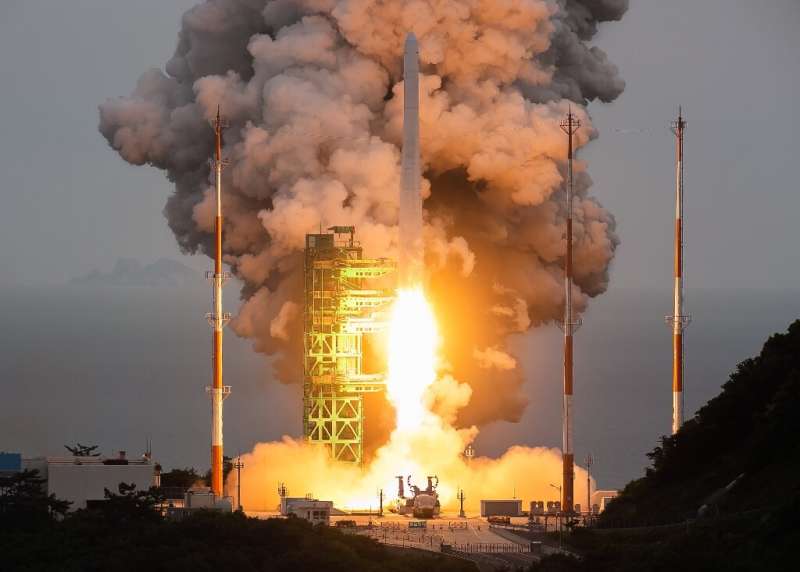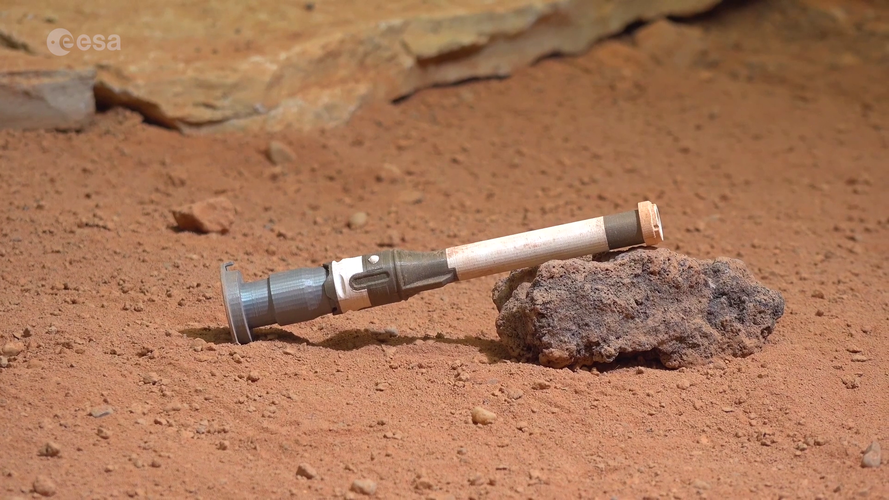Kleos enters into broad partnership with General Atomics
Thursday, 25 May 2023 10:33 Kleos Space S.A. (ASX: KSS, Frankfurt: KS1) has announced a strategic partnership with General Atomics Commonwealth Computer Research, Inc (GA-CCRI), a renowned global technology and defense company. This collaboration marks a significant milestone that will deliver benefits to Kleos and General Atomics customers and stakeholders globally.
As part of this partnership, Kleos will integrate
Kleos Space S.A. (ASX: KSS, Frankfurt: KS1) has announced a strategic partnership with General Atomics Commonwealth Computer Research, Inc (GA-CCRI), a renowned global technology and defense company. This collaboration marks a significant milestone that will deliver benefits to Kleos and General Atomics customers and stakeholders globally.
As part of this partnership, Kleos will integrate Ancient northern ocean on Mars evidenced by in situ observations of marine sedimentary rocks
Thursday, 25 May 2023 10:33 An international research team led by Professor Long Xiao from the School of Earth Sciences of China University of Geosciences (Wuhan) discovered the presence of marine sedimentary rocks on the surface of Mars for the first time by comprehensively analyzing the scientific data obtained by the multispectral camera (MSCam) carried by the Zhurong rover. The relevant research results were published
An international research team led by Professor Long Xiao from the School of Earth Sciences of China University of Geosciences (Wuhan) discovered the presence of marine sedimentary rocks on the surface of Mars for the first time by comprehensively analyzing the scientific data obtained by the multispectral camera (MSCam) carried by the Zhurong rover. The relevant research results were published A deep underground lab could hold key to habitability on Mars
Thursday, 25 May 2023 10:33 Tunnels deep underground in North Yorkshire are providing a unique opportunity to study how humans might be able to live and operate on the Moon or on Mars.
Researchers at the University of Birmingham have launched the Bio-SPHERE project in a unique research facility located 1.1 km below the surface, in one of the deepest mine sites in the UK. The project investigates how scientific and me
Tunnels deep underground in North Yorkshire are providing a unique opportunity to study how humans might be able to live and operate on the Moon or on Mars.
Researchers at the University of Birmingham have launched the Bio-SPHERE project in a unique research facility located 1.1 km below the surface, in one of the deepest mine sites in the UK. The project investigates how scientific and me Asymmetry in laws of physics could shed light on our existence
Thursday, 25 May 2023 10:33 For generations, physicists were sure the laws of physics were perfectly symmetric. Until they weren't.
Symmetry is a tidy and attractive idea that falls apart in our untidy universe. Indeed, since the 1960s, some kind of broken symmetry has been required to explain why there is more matter than antimatter in the universe - why, that is, that any of this exists at all.
But pinning do
For generations, physicists were sure the laws of physics were perfectly symmetric. Until they weren't.
Symmetry is a tidy and attractive idea that falls apart in our untidy universe. Indeed, since the 1960s, some kind of broken symmetry has been required to explain why there is more matter than antimatter in the universe - why, that is, that any of this exists at all.
But pinning do First components of Mobile Launcher 2 arrive at KSC
Thursday, 25 May 2023 10:33
The first components for a new mobile launch platform for NASA’s Space Launch System, which has suffered extensive cost and schedule overruns, have arrived at the Kennedy Space Center.
South Korea launches homegrown rocket after delay (Update)
Thursday, 25 May 2023 08:20
South Korea launched its homegrown Nuri rocket on Thursday, officials said, a day after it was forced to postpone due to a technical glitch just hours before lift-off.
It marks the third launch of the Nuri, which successfully put test satellites into orbit last year after a failed 2021 attempt saw the rocket's third-stage engine burn out too early.
Wednesday's launch was called off over a computer communication error which was resolved by Thursday, allowing the launch—a key step forward for the country's burgeoning space program—to go ahead.
The three-stage rocket, more than 47 meters (155 feet) long and weighing 200 tons, soared into the sky from the Naro Space Center in South Korea's southern coastal region, leaving a huge trail of white smoke.
South Korea hails successful launch of homegrown rocket (Update)
Thursday, 25 May 2023 08:20
South Korea launched its homegrown Nuri rocket on Thursday, officials said, a day after it was forced to postpone due to a technical glitch just hours before lift-off.
It marks the third launch of the Nuri, which successfully put test satellites into orbit last year after a failed 2021 attempt saw the rocket's third-stage engine burn out too early.
Wednesday's launch was called off over a computer communication error which was resolved by Thursday, allowing the launch—a key step forward for the country's burgeoning space program—to go ahead.
The three-stage rocket, more than 47 meters (155 feet) long and weighing 200 tons, soared into the sky from the Naro Space Center in South Korea's southern coastal region, leaving a huge trail of white smoke.
Picking up lightsabres for Mars
Thursday, 25 May 2023 07:00 Video:
00:02:10
Video:
00:02:10
Detect, fetch and collect. A seemingly easy task is being tested to find the best strategy to collect samples on the martian surface, some 290 000 million km away from home.
Testing technologies for Mars exploration is part of the daily job of Laura Bielenberg, an ESA graduate trainee for the Mars Sample Return campaign.
The test takes place at the rock-strewn recreation of the Red Planet at ESA’s ESTEC technical centre in Noordwijk, the Netherlands. The nickname of this test site is the ‘Mars Yard’ and is part of the Planetary Robotics Laboratory.
The tube is a replica of the sample
An improved view of global sea ice
Thursday, 25 May 2023 05:55
Earth’s declining ice is without a doubt one of the clearest signs of climate change. A new high-resolution sea-ice concentration data record has just been released as part of ESA’s Climate Change Initiative – providing new insights of sea ice concentration across the globe.
Rocket Lab prepares for second TROPICS launch for NASA
Thursday, 25 May 2023 03:16 Rocket Lab USA, Inc., a publicly traded company listed on Nasdaq as RKLB, is eagerly gearing up for the imminent launch of its second dedicated Electron mission, aiming to release a network of storm-tracking satellites for NASA. The mission, christened "Coming To A Storm Near You", is slated for a no earlier than 16:00 NZST lift-off on May 25th, to be carried out from Launch Complex 1 on the pic
Rocket Lab USA, Inc., a publicly traded company listed on Nasdaq as RKLB, is eagerly gearing up for the imminent launch of its second dedicated Electron mission, aiming to release a network of storm-tracking satellites for NASA. The mission, christened "Coming To A Storm Near You", is slated for a no earlier than 16:00 NZST lift-off on May 25th, to be carried out from Launch Complex 1 on the pic Multi-launch deal signed for OTV missions from Spaceport Nova Scotia
Thursday, 25 May 2023 03:16 Maritime Launch Services Inc. (NEO: MAXQ, OTCQB: MAXQF) reports that its launch manifest on its medium class launch vehicles has been committed through the end of 2027.
With a recent multi-mission Agreement signed for launching client OTVs from a manufacturer in the EU, Maritime Launch has secured medium-class launch vehicle capacity on multiple missions on a rideshare and dedicated payloa
Maritime Launch Services Inc. (NEO: MAXQ, OTCQB: MAXQF) reports that its launch manifest on its medium class launch vehicles has been committed through the end of 2027.
With a recent multi-mission Agreement signed for launching client OTVs from a manufacturer in the EU, Maritime Launch has secured medium-class launch vehicle capacity on multiple missions on a rideshare and dedicated payloa NASA continues key test series with rocket engine hot fire
Thursday, 25 May 2023 03:16 NASA completed a full duration hot fire of the RS-25 certification engine May 23, continuing a critical test series to support future SLS (Space Launch System) missions to deep space as NASA explores the secrets of the universe for the benefit of all.
The test on the Fred Haise Test Stand at NASA's Stennis Space Center near Bay St. Louis, Mississippi, marked the eighth in a 12-test certifi
NASA completed a full duration hot fire of the RS-25 certification engine May 23, continuing a critical test series to support future SLS (Space Launch System) missions to deep space as NASA explores the secrets of the universe for the benefit of all.
The test on the Fred Haise Test Stand at NASA's Stennis Space Center near Bay St. Louis, Mississippi, marked the eighth in a 12-test certifi Hitting the road after three weeks at Ubajara: Sols 3839-3840
Thursday, 25 May 2023 03:16 Earth planning date: Wednesday, May 24, 2023 - May has been a busy month for Curiosity. Our rover has been hard at work since arriving at its current location around the first of the month. In the three weeks since, Curiosity has thoroughly characterized the area around "Ubajara" and completed another successful drill campaign, its 38th such accomplishment. Curiosity's work now lies ahead, and l
Earth planning date: Wednesday, May 24, 2023 - May has been a busy month for Curiosity. Our rover has been hard at work since arriving at its current location around the first of the month. In the three weeks since, Curiosity has thoroughly characterized the area around "Ubajara" and completed another successful drill campaign, its 38th such accomplishment. Curiosity's work now lies ahead, and l Element creation in the lab deepens understanding of surface explosions on neutron stars
Thursday, 25 May 2023 03:16 Led by Kelly Chipps of the Department of Energy's Oak Ridge National Laboratory, scientists working in the lab have produced a signature nuclear reaction that occurs on the surface of a neutron star gobbling mass from a companion star. Their achievement improves understanding of stellar processes generating diverse nuclear isotopes.
"Neutron stars are really fascinating from the points of
Led by Kelly Chipps of the Department of Energy's Oak Ridge National Laboratory, scientists working in the lab have produced a signature nuclear reaction that occurs on the surface of a neutron star gobbling mass from a companion star. Their achievement improves understanding of stellar processes generating diverse nuclear isotopes.
"Neutron stars are really fascinating from the points of BlackSky and Spire create commercial, real-time AI-driven maritime custody service
Thursday, 25 May 2023 03:16 BlackSky Technology Inc. (NYSE: BKSY) and Spire Global, Inc. (NYSE: SPIR) have teamed up to create a real-time, commercially available Maritime Custody Service (MCS) that can automatically detect, identify and track more than 270 thousand vessels worldwide in open water, along rivers and canals, and while docked at port.
"BlackSky and Spire have developed a very cost-effective and flexible
BlackSky Technology Inc. (NYSE: BKSY) and Spire Global, Inc. (NYSE: SPIR) have teamed up to create a real-time, commercially available Maritime Custody Service (MCS) that can automatically detect, identify and track more than 270 thousand vessels worldwide in open water, along rivers and canals, and while docked at port.
"BlackSky and Spire have developed a very cost-effective and flexible 
